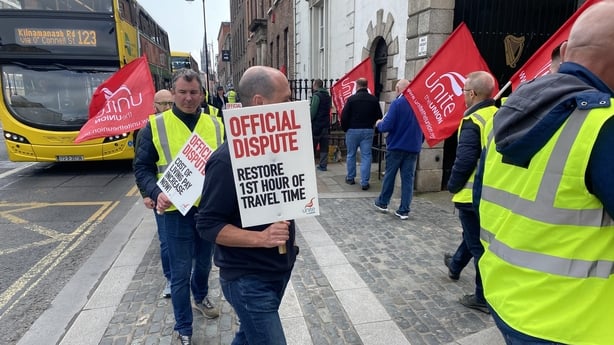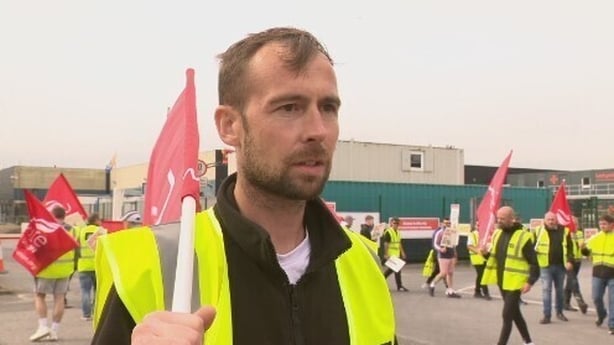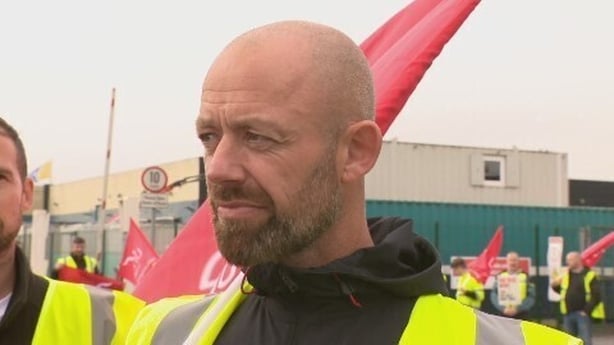Construction projects for major companies including Intel, Diageo, Eli Lilly, Analog and the ESB are being hit by industrial action.
Plumbers, fitters, welders and apprentices, who are members of the Unite trade union, are taking strike action in a dispute over travel allowances.
A full-day work stoppage began at midnight and involves pickets being placed on selected large construction sites where members of the Mechanical Engineering & Building Services Contractors' Association (MEBSCA) are carrying out works.
The sites involved are in Dublin, Cork, Limerick and Kildare.
The workers are seeking the restoration of a payment for the first hour of their travel time.
Last month Unite members voted overwhelmingly for industrial action in pursuit of restoration of the first hour of 'travel time'.
The decision to ballot for industrial action came after initial talks with MEBSCA broke down at the beginning of July.
Further talks were held last month but ended without agreement.

Unite said that the payment of the first hour of ‘travel time’ was originally cut as a temporary measure following the 2008 financial crash and that it was meant to be reviewed after a year.
The union said that in the absence of a meaningful offer from MEBSCA, further strike action will follow, with pickets being placed on additional sites.
"Unless MEBSCA returns to the table and engages meaningfully with Unite regarding restoration of the first hour of ‘travel time’, industrial action will escalate," said Unite regional officer James McCabe.
"Resolution of this dispute is in the employers’ hands," Mr McCabe said.
We need your consent to load this rte-player contentWe use rte-player to manage extra content that can set cookies on your device and collect data about your activity. Please review their details and accept them to load the content.Manage Preferences
MEBSCA has said that the first hour of 'travel time' has been incorporated into hourly rates since 2011 as part of an agreement reached with Unite.
"An agreement was entered into with Unite in 2011, which incorporated the first hour of travel into hourly rates," a MEBSCA spokesperson said.
"This agreement had the effect of increasing the hourly rate which also resulted in a higher rate being paid for overtime and holidays."
"Unite is now seeking to maintain the higher rate of pay while also seeking to reverse the agreement that was freely entered into by Unite at that time," MEBSCA said.

'Everything is going up'
Kevin Murphy is a plumber and he joined the picket line outside Analog in Limerick.
"Prices are going up, not down. We are only asking for the return of something we already lost," Mr Murphy said.
"We are trying to get back to where we were. We're nearly there but prices are still going up," he added.

Plumber Edward O'Donoghue was also on the picket line outside Analog.
"Going to work, the price of diesel, the price of lunches - everything is going up and it all adds up at the end of the week, so we are looking for our hour back and that is why we are out here picketing today," Mr O'Donoghue said.
'Long-running dispute'
Unite Regional Coordinating Officer Tom Fitzgerald said the strike action is likely to continue "for a number of weeks".
Speaking to RTÉ's Morning Ireland, he said cuts from 2011/2012 were not fully restored, despite workers "doing everything we possibly can" in terms of engaging with the Workplace Relations Commission and the Labour Court.
"At a certain stage, the only option available to workers is to withdraw labour, place pickets to try and move the employers to say well actually we'll do something decent here to restore that," he said.
"It is against the backdrop of hugely profitable companies and sectors," he added.
Mr Fitzgerald, who is on the picket line at Diageo in Dublin city centre, said it was a "long-running dispute".
He called on employers to engage "in a meaningful way" to prevent further stoppages.
"Our disputes committee makes the decision on a week-to-week basis," he said.
"Central to that decision making is the response and reaction from employers, if they're prepared to engage with us because, ultimately, they all know that's how disputes resolve themselves," he added.






